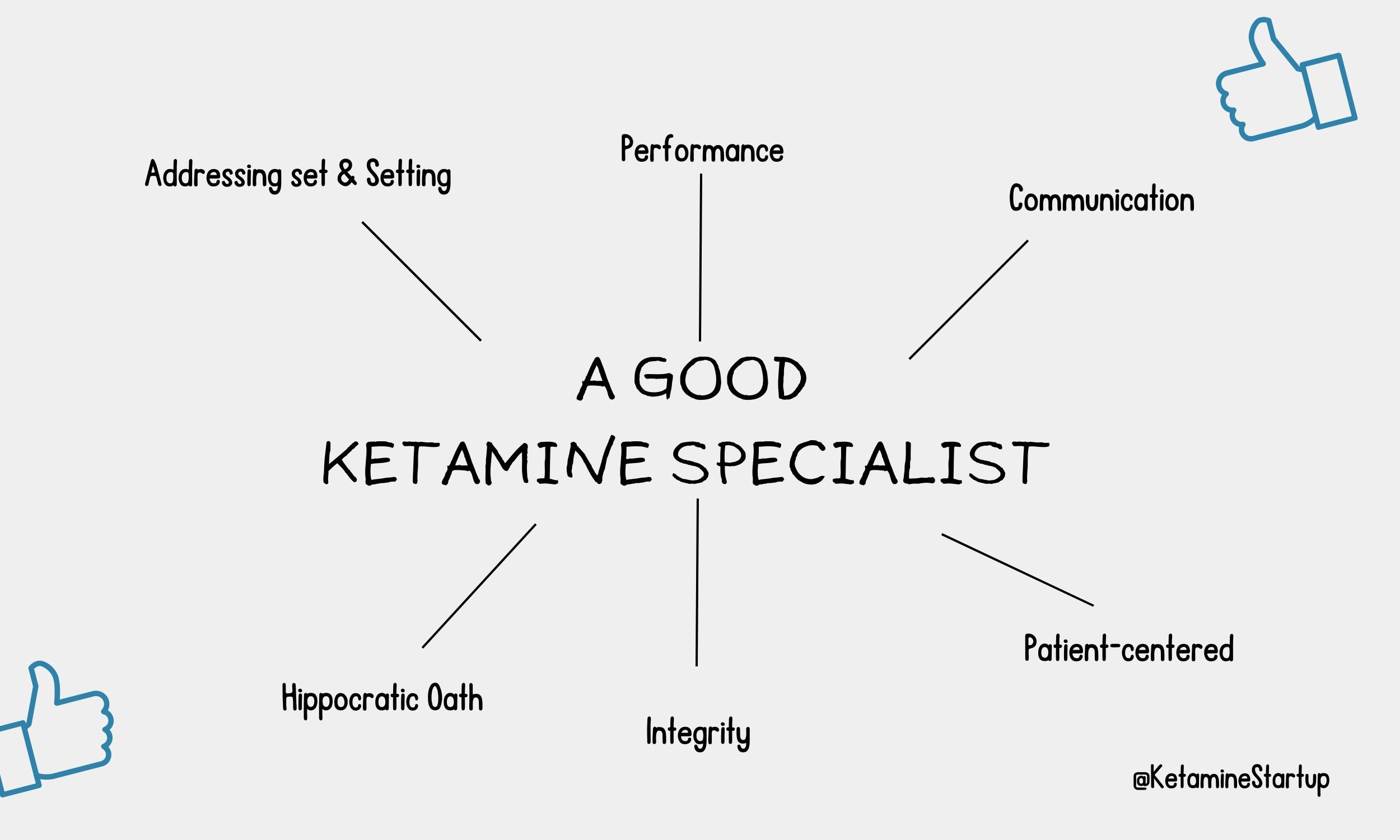What Specialities Can Provide Ketamine Treatments?
In this blog, we explore what medical specialties can provide ketamine treatments. We’ll be emphasizing the importance of patient-centered care and a holistic, psychedelically-informed approach for success in ketamine therapy. Plus, learn about the key qualities of a good ketamine specialist and why proper set and setting in the treatment process are so essential.
A question we often get asked is, “what specialties can provide ketamine treatments?” In this blog, we’ll answer this question in depth. But if you want to know the answer in a nutshell, it's this…technically, any licensed physician can provide ketamine treatments, but read on to find out more.
As of the moment, there are no regulations as to which specialties are allowed to provide ketamine therapy.
The specialities who traditionally provide ketamine therapy
As of the writing of this blog, there are no federal mandates or regulations stating who can and cannot perform ketamine infusions for the treatment of mood or pain disorders. If you are a physician, CRNA or PA working with a licensed physician, you can technically administer ketamine infusions.
However, ketamine infusion therapy is still a very new treatment and legislation has been in development, such as in Utah that could restrict what medical professionals are allowed to administer this medication. At the end of the day, we recommend you do your own research in the state you are considering to open a ketamine clinic regarding any new legislation that could affect your practice.
Find out more about the licenses you need to open a ketamine clinic here at our blog.
Traditionally, you are going to find specialists who either have training and experience in using ketamine. This can be anesthesia and emergency medicine or in the diagnosis of mood disorders like psychiatry. But if you were to do a little research, you’d find there are medical professionals who didn't have any of the aforementioned training that provide ketamine infusions. So in a nutshell, if you’re a licensed medical professional, you can provide ketamine infusions, regardless of your specialty, as long as the specialist knows how to perform these infusions.
In terms of learning how to provide ketamine in a ketamine clinic setting, there is no formal training, centralized training, nor mandated way to perform the infusions. It is up to the practitioner to find their own training on how to perform infusions, address emergencies, etc.
There is more to ketamine therapy than just providing the medicine. Ketamine specialists are also recommended to provide the right set and setting for their patients.
Going beyond Diagnosis and Treatment: Set & Setting
Yes, there are certain specialties that have training in using ketamine or traditionally diagnosing the conditions that these ketamine infusions treat. However, that doesn’t mean they are the only ones that should or are best suited to be a ketamine specialist.
Ketamine therapy is unlike other treatments found in traditional medicine. Patients can have a psychedelic experience with infusion therapy. This experience can be profound and healing for the patient. But if this experience is not addressed or supported, it can be detrimental to the patient.
This is where the concept of set and setting comes into play. “Set” is short for mindset, and refers to the mindset or mental state the patient brings to the infusion therapy appointment. “Setting” refers to the physical and social environment where the ketamine experience will occur.
Paying special attention to “set and setting” is key, especially when providing transformational ketamine infusion therapy. At the moment, no specialty in traditional medicine has an edge on this nor formal training in it! In the future though, that will be different as more and more ketamine clinics emerge.
Timothy Leary, psychologist and psychedelic medicine advocate put it well in his book The Psychedelic Experience: A Manual Based on the Tibetan Book of the Dead:
“Of course, the drug dose does not produce the transcendent experience. It merely acts as a chemical key — it opens the mind, frees the nervous system of its ordinary patterns and structures. The nature of the experience depends almost entirely on set and setting…”
Learn more about this topic in our blog post, The Importance of Set & Setting During Ketamine Infusions.
We believe that a licensed medical professional who approaches ketamine infusions with respect for set and setting, addresses integration after the infusion, plus performs good patient-care (taking a good history, performing necessary physical exam, reviewing labs, etc) can be a great ketamine specialist. Of course there are plenty of clinics that don’t take a psychedelically-informed approach to ketamine infusion therapy, which is unfortunate and does a disservice to the patient.
Becoming a “good” ketamine specialist entails more than just being good at providing infusions. It’s about giving your patients a holistic experience.
What makes a “good” ketamine specialist?
Another way to answer this question is by changing perspective and asking this instead, “If I or my loved one were to get a ketamine infusion therapy, where would I want them to be treated?” Here is a short list of answers:
Knows how to perform ketamine infusions and know how to handle emergencies
Good at communicating what to expect and anticipate before, during, and after the treatments
Is patient-centered and focused
Has integrity
Follows the Hippocratic oath
Provides ketamine therapy with a holistic, psychedelically informed manner: addressing set & setting and integration in particular
Do any of the above state a particular speciality? No! This is a good reminder that it’s not about the specialty you're in that will determine whether you’ll become a “good” ketamine specialist. It’s how you treat your ketamine patients that truly matter!
What specialization you are in isn’t as important as how well you take care of your patients when it comes to becoming a good ketamine doctor.
In conclusion, the most important factor in being a ketamine specialist is not necessarily one's specialty, but rather the ability to provide patient-centered care, focusing on the transformational aspects of ketamine infusion therapy. By learning how to perform infusions safely and effectively, addressing set and setting, and integrating the experience with traditional medical practices, any licensed medical professional could become a successful ketamine specialist.
Are you ready to explore the possibility of opening and managing your own ketamine clinic? Join our email list and be notified about the next free webinar/ketaminestartup.com/webinar and open registration for Ketamine StartUp.
Related Questions:
How can medical professionals from different specialties collaborate effectively to provide comprehensive ketamine therapy for patients?
Speaking from personal experience, you and those you are working with need to have a desire to truly help their patient. All parties being patient-focused is primary, followed by clear and effective communication. That means updating each other on how the patient you share is doing. You want to be clear on the roles each of you are taking on. If you aren’t a psychiatrist, don’t take that role on! You are here to work with not against the other specialties. You are here to provide a service that your medical community is in need of, not steal business.
How can I foster the best patient experience in regards to set and setting when starting a ketamine infusion clinic?
We’re probably sounding like a broken record here, but keeping your patient’s well being and experience as the focus can help guide you. Take time to learn about how to create a healing environment during psychedelic treatments. Some steps you can take is to support your patient in preparing for the infusion with reflection, meditation, journaling, and creating an intention. During the infusion, you and your staff should be mentally present with the patient, and create a safe and inviting environment. Some ways you can do this is by adding soft, soothing lighting, aroma therapy, eye shades, and music.
If you found this blog helpful, check out these too:
Why Your Patients Should Set An Intention Before Their Infusion
Did you know that there was a study conducted that found that tea intentionally treated by Buddhist monks actually had a positive impact on those who drank the tea? Just like tea, encouraging your patients to set an intention before their infusion can positively impact their experience. Read this blog to learn more.
The Importance Of Music For Your Ketamine Patients
During ketamine infusions, it’s important to create the right set & setting for your patients. This includes playing the right music, which creates a more positive and transformative experience. Find out why music is so crucial in this blog post.
5 Practices to Maximize Your Ketamine Patient's Treatment
There’s no doubt that ketamine is an effective treatment for mood and pain disorders. However, we’d be lying if we tell you that ketamine is the only thing your patients need to truly heal. In this blog, we talk about some helpful practices your patients may incorporate into their treatment to truly maximize their progress and healing.








Texas proposes mandatory ketamine clinic registration, onsite physician requirements, and home-use ban. What it means for your practice and the industry.